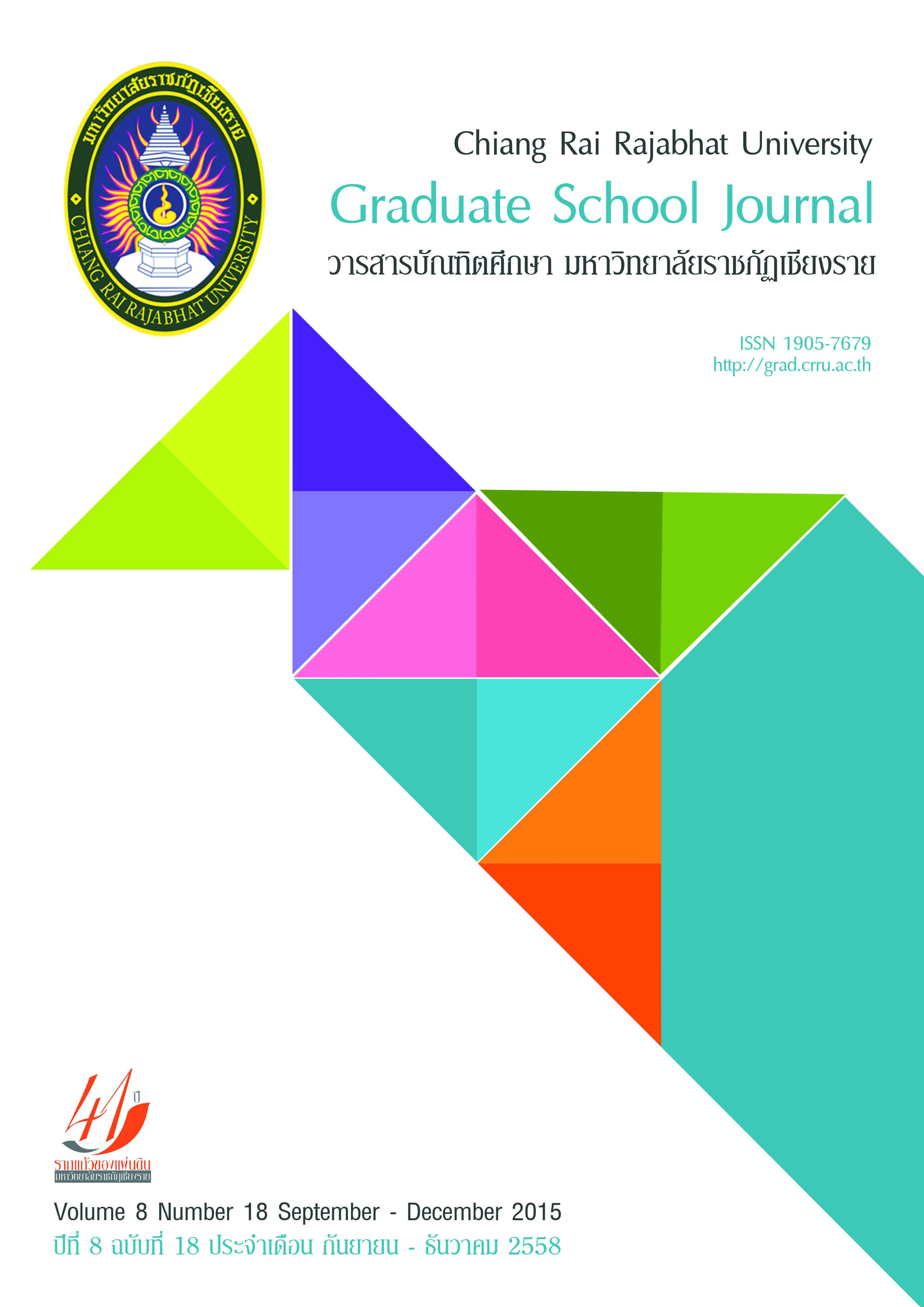ผลการใช้ชุดกิจกรรมของเล่นภูมิปัญญาท้องถิ่นเพื่อพัฒนาทักษะกระบวนการทางวิทยาศาสตร์ของนักเรียนชาติพันธุ์ ชั้นประถมศึกษาปีที่ 2
Main Article Content
บทคัดย่อ
เครื่องมือที่ใช้ในการวิจัย ได้แก่ ชุดกิจกรรมของเล่นภูมิปัญญาท้องถิ่นของนักเรียนชาติพันธุ์ ชั้นประถมศึกษาปีที่ 2 จำนวน 8 ชุด แผนการจัดการเรียนรู้แบบปกติของสถาบันส่งเสริมการสอนวิทยาศาสตร์และเทคโนโลยี (สสวท.) และตามหลักสูตรแกน กลางการศึกษาขั้นพื้นฐาน พุทธศักราช 2551 กลุ่มสาระการเรียนรู้วิทยาศาสตร์ เรื่อง ของเล่นของใช้ ระดับชั้นประถมศึกษาปีที่ 2 จำนวน 8 แผน แบบวัดทักษะกระบวนการทางวิทยาศาสตร์จำนวน 40 ข้อใช้วัดทักษะกระบวนการทางวิทยาศาสตร์ขั้นพื้นฐาน ได้แก่ ทักษะการสังเกต ทักษะการวัด ทักษะการจำแนกประเภท ทักษะการใช้ความสัมพันธ์ระหว่างสเปสกับสเปสและสเปสกับ เวลา ทักษะใช้ตัวเลขหรือการคำนวณ ทักษะการจัดกระทำและสื่อความหมายข้อมูล ทักษะการลงความคิดเห็นจากข้อมูลและ ทักษะการพยากรณ์ แบบสอบถามความคิดเห็นของผู้เรียนที่มีต่อการจัดกิจกรรมการเรียนรู้วิชาวิทยาศาสตร์
วิเคราะห์ข้อมูลโดยใช้ค่าสถิติ คือ ความถี่ ร้อยละ ค่าเฉลี่ย ( ) ส่วนเบี่ยงเบนมาตรฐาน (S.D.) ผลการวิจัยพบว่า ทักษะ กระบวนการทางวิทยาศาสตร์ของนักเรียนที่ได้รับการจัดกิจกรรมการเรียนรู้ด้วยชุดกิจกรรมของเล่นภูมิปัญญาท้องถิ่น ของนักเรียน ชาติพันธุ์ชั้นประถมศึกษาปีที่ 2 หลังเรียนสูงกว่าก่อนเรียนอย่างมีนัยสำคัญทางสถิติที่ระดับ .01 นักเรียนที่จัดกิจกรรมการเรียน รู้โดยชุดกิจกรรมของเล่นภูมิปัญญาท้องถิ่น มีทักษะกระบวนการทางวิทยาศาสตร์หลังเรียนสูงกว่า นักเรียนที่จัดกิจกรรมการเรียน รู้แบบปกติอย่างมีนัยสำคัญทางสถิติที่ระดับ .01 และค่าเฉลี่ยความคิดเห็นโดยรวมของนักเรียนชาติพันธุ์ ชั้นประถมศึกษาปีที่ 2 ที่มีต่อการจัดกิจกรรม โดยการใช้ชุดกิจกรรมของเล่นภูมิปัญญาท้องถิ่น ได้แก่ ความคิดเห็นด้านเนื้อหา ด้านกิจกรรมการเรียนรู้ ด้านสื่อและแหล่งเรียนรู้ ตามลำดับ
The Implementation of Local Play-Oriented Learning Modules Designed For Mattayomsueksa 2 Ethnical Students’ Scientific Skill Improvements
The purposes of this study aimed to explore the Mattayomsueksa 2 ethnical students’ scientific pretest compared with their posttest obtained from the implementation of the Mattayomsueksa 2 ethnical students’ local play-oriented scientific learning modules, and the Mattayomsueksa 2 ethnical students’ scientific process skills obtained from the implementation of the Mattayomsueksa 2 ethnical students’ local play-oriented scientific learning modules compared with their scientific learning management, as well as to survey the Mattayomsueksa 2 ethnical students’ opinions towards the implementation of local playoriented scientific learning modules.
For data collection, seven Mattayomsueksa 2 students studying in Mae Ta Chang School, the Office of Chiangrai Primary Education Services Area 2 were used as a sampling group, and thirteen Mattayomsueksa 2 students studying in Huai Ma Kaeng School, the Office of Chiangrai Primary Education Services Area were used as a controlled group. Research instruments drawn for this study included eight series of local playoriented scientific learning modules; eight lesson plans designed by National Science Center for Education (NSCE) and the B.E. 2521 Basic Educational Curriculum; a test on student’s scientific learning process skills with 40 questions related to observation, evaluation, categorization, application of correlations between space-to-space and space-to-time, accountability, data interpretation, conclusion-drawing, and prediction, as well as a questionnaire related to student’s opinions towards the implementation of scientific instructional management. The data were statistically analyzed through using frequency distribution, percentage, mean, standard deviation, t-test (Dependent Sample), and t-test (Independent Sample).
The findings of the study revealed that their posttest, with its significant difference of 0.01, obtained from the implementation of the Mattayomsueksa 2 ethnical students’ local play-oriented scientific learning modules was higher than that of their pretest. Otherwise, their scientific learning process skills, with its significant difference of 0.01, obtained from the implementation of the Mattayomsueksa 2 ethnical students’ local play-oriented scientific learning modules were higher than that of those obtained from their scientific instructional management. Also, the Mattayomsueksa 2 ethnical students’ opinions towards the implementation of the Mattayomsueksa 2 ethnical students’ local play-oriented scientific instructional management were mostly observed in terms of their contents, scientific learning activities, as well as visual aids and indigenous learning resources.
Article Details
บทความที่ได้รับการตีพิมพ์เป็นลิขสิทธิ์ของวารสารมหาวิทยาลัยราชภัฎเชียงราย
ข้อความที่ปรากฏในบทความแต่ละเรื่องในวารสารวิชาการเล่มนี้เป็นความคิดเห็นส่วนตัวของผู้เขียนแต่ละท่านไม่เกี่ยวข้องกับมหาวิทยาลัยราชภัฎเชียงราย และคณาจารย์ท่านอื่นๆในมหาวิทยาลัยฯ แต่อย่างใด ความรับผิดชอบองค์ประกอบทั้งหมดของบทความแต่ละเรื่องเป็นของผู้เขียนแต่ละท่าน หากมีความผิดพลาดใดๆ ผู้เขียนแต่ละท่านจะรับผิดชอบบทความของตนเองแต่ผู้เดียว


